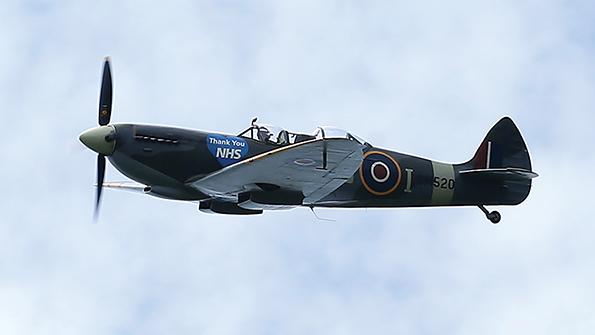Opinion: Is COVID-19 The Modern Battle of Britain?

There has been much talk recently of National Health Service (NHS) workers in the UK as the “Spitfire pilots” of our generation and ventilators as the “Spitfires.” But why? Are there any similarities? Why do we reach back to World War II in times of crisis, and what can we take from doing so?
This year is the 80th anniversary of the Battle of Britain, which left an indelible mark on the UK’s national psyche. The battle came quickly after a period of warning in 1940. It was fought by just a small portion of society, using advanced equipment. The “Few” were supported by the “Many,” and of course, everyone was at risk. If we had lost, many hundreds of thousands would have died and our way of life would have changed forever.
So it’s not hard to see the parallels with today’s enemy, COVID-19. It threatens the world in a battle where death touches us all.
But let’s dig under the surface a little. In World War II, millions of people played their part by supporting the war effort in whatever way they could. This was a time when people pulled together and communities donated metal to make aircraft.
In the battle, pilots developed the “thousand-yard stare,” a combination of exhaustion, fatigue, constant fear and the need to take life and death decisions. That look is back.
And we are responding. Communities are buying meals for frontline medical staff who are working hideously long hours and seeing things no one should have to endure, while face visors are being made by 3D printers in homes and at RAF Leeming, England.
During the 1940s, industry responded. Car manufacturers shifted their operations toward aircraft production, automobile engine makers turned to aero engines and clothes companies made fabric for wings.
Today, companies such as Airbus, Cobham, BAE Systems, Rolls-Royce, Formula 1 and even vacuum cleaner companies are making ventilators. Clothing companies such as Burberry are making personal protective equipment items. Even gin and beer companies have been pressed into making hand sanitizer. The point is, it’s a global effort.
However, most of us watch the war being fought on our home soil but cannot do much. In fact, the best thing we can do is to stay home. It’s confusing and frustrating that staying home and avoiding social contact is absolutely the best thing we can do to support the front line in this conflict. But during the Blitz, each and every person who carefully covered up their windows, masked their headlights and watched what they said in public places was contributing in a small yet vital way, just as they are now.
The Battle of Britain has become associated with a certain age bracket, mainly old men. Of course, the reality is that the “Few” were supported by the “Many.” These men were predominantly young at the time—too young for the horrors that awaited them—but they were united through love of their country and their people. They were men and women from a variety of nations working together, just as we are seeing now. (The two nurses who recently cared for Prime Minister Boris Johnson in his hour of need were from New Zealand and Portugal.)
Necessity is, of course, the driver of innovation. In 1940, as in 2020, technology was accelerated: Fuel systems, engines, armor, the world’s first integrated air defense system and radar all emerged in a very short space of time, along with the rather famous Spitfire elliptical-wing fighter. Today, the same drivers of technological innovation are there and will result in giant leaps forward and progress coming in times of need.
So what to draw from all this? Well, the UK has faced similar challenges before. It is a country that rises to adversity. We have incredible people in all walks of life. When the call comes, they answer it by showing courage and selflessness—to a degree that seemed barely believable just a few short weeks before. On top of that, the UK still possesses great technological prowess. We have strong alliances, and we fiercely protect our own. We have what Churchill might have called “spine.”
I am a member of the RAF, the organization that fought the original Battle of Britain in World War II. We work alongside the Royal Navy, the British Army and all our civil servants to contribute to the campaign fighting against the COVID-19 coronavirus pandemic. And as we work together to defend our nation, I salute the NHS and every person who is supporting them. These brave people risk their lives and enter combat each and every day. They are undoubtedly uncomfortable with the word “hero,” but they nevertheless are desperately glad for the support and recognition of their efforts across the nation. Like us, they are also looking forward to the sunny day on which we shall meet again, picnic in the park and not watch dismal news on TV.
Air Vice Marshal Ian Gale is the assistant chief of the air staff for the UK’s Royal Air Force.
The views expressed here are his and are not necessarily those of Aviation Week.
Comments